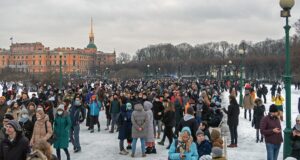By Rob Marchant – Senior Fellow.
9th January 2014, Human Rights and Conflict Resolution, Issue 1, No. 1.
Moscow, I have recently discovered, has a decent daily English-language newspaper, the Moscow Times. Among the dull things which interest Western business people (“Leasing Commercial Property: A New Approach To An Old Problem” – zzzzz), it has a lively Opinion section which is well worth a read.Now, while its attitude to the Putin government tends to be a fairly balanced criticism rather than either cosying up it or vitriol against it, neither is it afraid to criticise, unlike a seemingly increasing number of other Russian media outlets. And the picture that it paints is that of a country in a state of transition; not so much to a bright new future, but one of slipping back into some rather bad habits of the past.Some example headlines, with my own comments, below:
- Russia Says U.S. Ignored Appeals for Syria Chemical Arms Proof – Oddly, the US did not pay any attention to the argument coming from Moscow that it was not actually Assad but Syrian rebels who organised the gassing of children in August, on the grounds that it was (a) untrue, and (b) patently ridiculous.
- The New State Media Behemoth – The dismantling of the one state media agency, RIA Novosti, which had a reputation for objective reporting, and its replacement by one headed by a violently homophobic, pro-Putin TV host does not exactly bode well for a free Russian press.
- Amnesty Bill Passes 2nd Duma Reading – Recently, President Putin has graciously agreed to the release of 20,000 prisoners (who probably should never have been locked up in the first place). These may include, potentially, three members of imprisoned punk band Pussy Riot, which is welcome news. On the other hand, it is difficult to see even this apparent concession to human rights as anything other than a transparent ploy to get Western commentators off Russia’s back in advance of the Sochi Winter Olympics, which various foreign politicians and dignitaries have already agreed to boycott in protest of his government’s current stance on homosexuality and human rights.
- Putin’s Conservative State Capitalism – the current parallels with the Soviet era are not only tied up with civil liberties; the government is increasingly leaning towards state-owned companies with monopoly power, and central planning. Not a very sensible strategy in a country which has recently gone from a powerhouse BRICs economy to a net under-performer of world GDP.
- Putin Wins Over Ukraine With Gas Deal and $15Bln Bailout – Not to put too fine a point on it, the Russian government has this week bought the loyalty of the Ukraine government with hard cash. A country whose population is split down the middle between its Russian-leaning east and EU-leaning west has had to choose which side of the fence to jump, and it is towards Moscow. Thousands of Ukrainians who understand the enormity of this decision have taken to the streets to protest it and, somewhat chillingly, it was reported that various Russian secret service agents had been despatched to Kyiv to help deal with the reaction. Putin, meanwhile, would like the Ukraine to join the deathly embrace customs union Russia currently enjoys with Belarus, affectionately known as “Europe’s last dictatorship”. Any freedom-loving Ukrainian should be worried.
- Moscow’s Largest Gay Club Comes Under Attack, Director Says – Not surprisingly, when the government legalises anti-gay discrimination and turns a blind eye to anti-gay attacks, such attacks start to become something of a free-for-all (something similar happened with Jews in the 1930s, after attacking them was given the nod by a certain government). And if – horror of horrors – you happen to be a gay parent in Russia, well, you had really better leave the country right away, if you want to hang on to your kids.
All of this points to a country whose creeping authoritarianism is slowly but surely becoming a danger to the wellbeing of its own citizens. But perhaps the most disturbing news of the last few days was about it potentially becoming a danger to that of other countries’ citizens, and one which many citizens of both Russia and the West may still be blissfully unaware:
- Missiles in Western Russia Are Legitimate, Defense Ministry Says – As a response to NATO’s European missile shield, the Russian government has decided to put nuclear-capable missiles in its little outpost of Kaliningrad, a piece of Russian soil snuggled between Lithuania and Poland. The Lithuanians, just like the Ukrainians over the bailout deal, are nervous of what looks like the early signs of a future programme involving naked expansionism.
They’re right to be. We should all be, because we’ve seen this movie before. It’s what we used to call “spheres of influence”, behind the old Iron Curtain.
In short, the essence of all this is that Cold War: The Sequel looks like it might be coming soon, to a country near you.
 Human Security Centre Human Rights and International Security Research
Human Security Centre Human Rights and International Security Research




